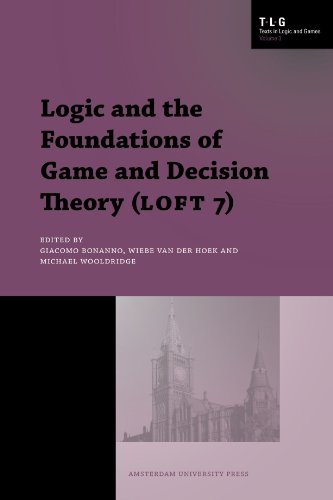
Logic and the Foundations of Game and Decision Theory
by Giacomo Bonanno, et al.
Publisher: Amsterdam University Press 2008
ISBN/ASIN: 9089640266
ISBN-13: 9789089640260
Number of pages: 240
Description:
LOFT is a key venue for presenting research at the intersection of logic, economics and computer science, and the present collection gives a lively and wide-ranging view of an exciting and rapidly growing area. This volume collects together revised papers originally presented at the 7th Conference on Logic and the Foundations of Game and Decision Theory (LOFT 2006).
Download or read it online for free here:
Download link
(4.2MB, PDF)
Similar books
 Multiagent Systems: Algorithmic, Game-Theoretic, and Logical Foundations
Multiagent Systems: Algorithmic, Game-Theoretic, and Logical Foundationsby Yoav Shoham, Kevin Leyton-Brown - Cambridge University Press
Multiagent systems consist of multiple autonomous entities having different information and diverging interests. This comprehensive introduction to the field offers a computer science perspective, but also draws on ideas from game theory.
(13456 views)
 An Introduction to Quantum Game Theory
An Introduction to Quantum Game Theoryby J. Orlin Grabbe - arXiv
This essay gives a self-contained introduction to quantum game theory, and is primarily oriented to economists with little or no acquaintance with quantum mechanics. It assumes little more than a basic knowledge of vector algebra.
(11447 views)
 Graduate-Level Course in Game Theory
Graduate-Level Course in Game Theoryby Jim Ratliff
Lecture notes from a game-theory course the author taught to students in their second year of the economics PhD program. The material is also helpful to first-year PhD students learning game theory as part of their microeconomic-theory sequence.
(16588 views)
 Agent-Based Evolutionary Game Dynamics
Agent-Based Evolutionary Game Dynamicsby L.R. Izquierdo, S.S. Izquierdo, W.H. Sandholm - Pressbooks
This book is a guide to implement simple agent-based evolutionary models using NetLogo. All the models we implement are agent-based, i.e. individual agents and their interactions are explicitly represented in the models ...
(4800 views)